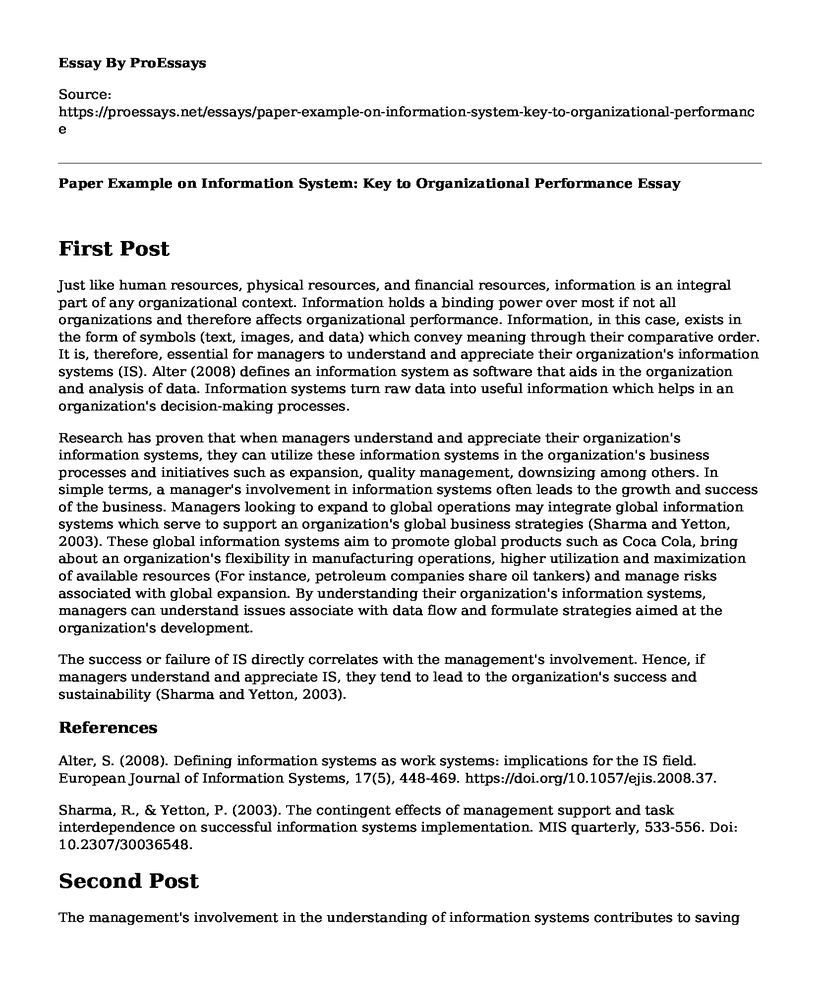First Post
Just like human resources, physical resources, and financial resources, information is an integral part of any organizational context. Information holds a binding power over most if not all organizations and therefore affects organizational performance. Information, in this case, exists in the form of symbols (text, images, and data) which convey meaning through their comparative order. It is, therefore, essential for managers to understand and appreciate their organization's information systems (IS). Alter (2008) defines an information system as software that aids in the organization and analysis of data. Information systems turn raw data into useful information which helps in an organization's decision-making processes.
Research has proven that when managers understand and appreciate their organization's information systems, they can utilize these information systems in the organization's business processes and initiatives such as expansion, quality management, downsizing among others. In simple terms, a manager's involvement in information systems often leads to the growth and success of the business. Managers looking to expand to global operations may integrate global information systems which serve to support an organization's global business strategies (Sharma and Yetton, 2003). These global information systems aim to promote global products such as Coca Cola, bring about an organization's flexibility in manufacturing operations, higher utilization and maximization of available resources (For instance, petroleum companies share oil tankers) and manage risks associated with global expansion. By understanding their organization's information systems, managers can understand issues associate with data flow and formulate strategies aimed at the organization's development.
The success or failure of IS directly correlates with the management's involvement. Hence, if managers understand and appreciate IS, they tend to lead to the organization's success and sustainability (Sharma and Yetton, 2003).
References
Alter, S. (2008). Defining information systems as work systems: implications for the IS field. European Journal of Information Systems, 17(5), 448-469. https://doi.org/10.1057/ejis.2008.37.
Sharma, R., & Yetton, P. (2003). The contingent effects of management support and task interdependence on successful information systems implementation. MIS quarterly, 533-556. Doi: 10.2307/30036548.
Second Post
The management's involvement in the understanding of information systems contributes to saving financial resources that would otherwise be used up in automating unproductive processes, thereby leading to business failure. Despite the various arguments supporting information systems and the management's involvement in the same, some managers still overlook the importance of information systems within organizations. The problem with this notion is that it ignores the diverse nature of an organization's information needs (Merali, Papadopoulos and Nadkarni, 2012). Frequent communication between an organization's business units should be regular to meet the business' requirements accurately. In essence, information systems work to communicate an organization's dynamics. By understanding and participating in the information systems decisions of their organizations, the management is more likely to develop the organization's core competencies: evaluate the effectiveness of information systems, develop its project management skills and coordinate organizational processes and systems (Kearns and Lederer, 2000). In summary, managers need to understand the role the information systems play within the organization and identify the potential opportunities that these systems can create.
References
Kearns, G. S., & Lederer, A. L. (2000). The effect of strategic alignment on the use of IS-based resources for competitive advantage. The Journal of Strategic Information Systems, 9(4), 265-293. https://doi.org/10.1016/S0963-8687(00)00049-4.
Merali, Y., Papadopoulos, T., & Nadkarni, T. (2012). Information systems strategy: Past, present, future? The Journal of Strategic Information Systems, 21(2), 125-153. https://doi.org/10.1016/j.jsis.2012.04.002.
Cite this page
Paper Example on Information System: Key to Organizational Performance. (2023, Feb 11). Retrieved from https://proessays.net/essays/paper-example-on-information-system-key-to-organizational-performance
If you are the original author of this essay and no longer wish to have it published on the ProEssays website, please click below to request its removal:
- Personal Statement on Supply Chain and Operational Management
- Verizon Inc. Analysis Paper Example
- Texas Legislature Sessions Essay
- Gun Violence and Social Media Crisis Cases Paper Example
- History of Leadership Essay Example
- Selecting a Career: Essential Information for Young Adults - Essay Sample
- Essay Example on Target's Data Security: Ensuring Trust and Safety







